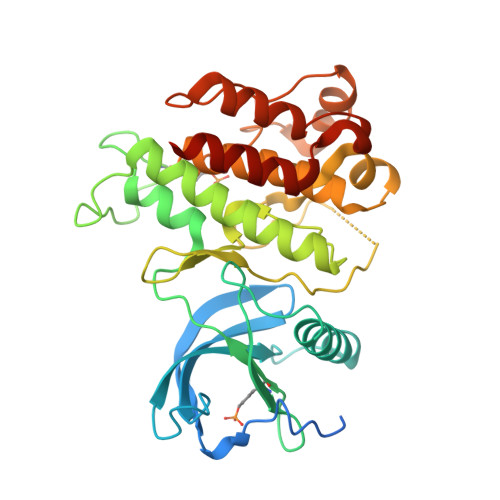Discovery of Potent and Selective Inhibitors of Wild-Type and Gatekeeper Mutant Fibroblast Growth Factor Receptor (FGFR) 2/3.
Shvartsbart, A., Roach, J.J., Witten, M.R., Koblish, H., Harris, J.J., Covington, M., Hess, R., Lin, L., Frascella, M., Truong, L., Leffet, L., Conlen, P., Beshad, E., Klabe, R., Katiyar, K., Kaldon, L., Young-Sciame, R., He, X., Petusky, S., Chen, K.J., Horsey, A., Lei, H.T., Epling, L.B., Deller, M.C., Vechorkin, O., Yao, W.(2022) J Med Chem 65: 15433-15442
- PubMed: 36356320
- DOI: https://doi.org/10.1021/acs.jmedchem.2c01366
- Primary Citation of Related Structures:
8E1X - PubMed Abstract:
Upregulation of the fibroblast growth factor receptor (FGFR) signaling pathway has been implicated in multiple cancer types, including cholangiocarcinoma and bladder cancer. Consequently, small molecule inhibition of FGFR has emerged as a promising therapy for patients suffering from these diseases. First-generation pan-FGFR inhibitors, while highly effective, suffer from several drawbacks. These include treatment-related hyperphosphatemia and significant loss of potency for the mutant kinases. Herein, we present the discovery and optimization of novel FGFR2/3 inhibitors that largely maintain potency for the common gatekeeper mutants and have excellent selectivity over FGFR1. A combination of meticulous structure-activity relationship (SAR) analysis, structure-based drug design, and medicinal chemistry rationale ultimately led to compound 29 , a potent and selective FGFR2/3 inhibitor with excellent in vitro absorption, distribution, metabolism, excretion (ADME), and pharmacokinetics in rat. A pharmacodynamic study of a closely related compound established that maximum inhibition of downstream ERK phosphorylation could be achieved with no significant effect on serum phosphate levels relative to vehicle.
Organizational Affiliation:
Prelude Therapeutics, Wilmington, Delaware 19803, United States.
















